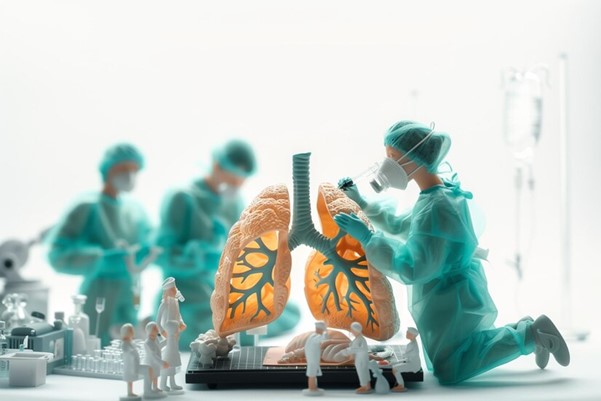A surgical procedure in which a diseased or damaged lung is replaced with a healthy lung from a donor.
It is usually performed when other treatments, such as medication and lifestyle changes, are no longer effective.
Why is a Lung Transplant Done?
A lung transplant is done when the lungs are damaged or diseased and unable to perform their normal functions.
Common Causes
- End-stage lung diseases (COPD, Interstitial Lung Disease, Cystic Fibrosis)
- Scarring of the lungs
- High blood pressure in the lungs
A lung transplant is the last option for treating lung failure.
How to Prepare for a Lung Transplant?
Your doctor will evaluate your overall health and the severity of your lung disease by performing a thorough physical exam, imaging, and lung function tests.
You also need to make lifestyle changes, such as losing weight and giving up smoking if you are overweight, to minimize risks.
After Lung Transplant: When to Call Your Doctor?
Call your doctor if you have signs of rejection, such as:
- Fever of 100.4°F or Higher
- Chest Pain
- Flu-like Symptoms (Body Aches)
- Tiredness
- Feeling Short of Breath
- Cough
How Long Does a Lung Transplant Take?
The duration of a lung transplant depends on whether you need a single or double lung transplant.
- Single Lung Transplant: 4-8 hours
- Double Lung Transplant: 6-12 hours
What to Expect After a Lung Transplant?
The time to fully recover from a lung transplant varies widely between individuals.
Activities to ensure the long-run success of the transplant include:
- Regular physical therapy and rehabilitation exercises
- Regular Follow-up
- Regular imaging tests to monitor lung functioning
Post-operative Care for Lung Transplant
- Keep the incisions clean and dry
- Take your medication as prescribed
- Practice good hygiene
- Follow a healthy diet and exercise regularly
- Maintain a healthy weight
- Avoid Caffeine, Alcohol, and Tobacco
- Avoid strenuous activities and contact sports
- Wear a face mask
- Avoid exposure to pollutants and chemicals
- Manage stress and get plenty of rest
What is the recovery time after a lung transplant?
The average recovery time after a lung transplant is around three to six months. However, it can take up to a year to fully recover from the surgery and adjust to the new lung. During this time, it is important to attend regular check-ups with the doctor to monitor the progress.
What are the Advantages of a Lung Transplant?
- Improved Quality of Life
- Improved Exercise Tolerance
- Reduced Risk of Complications
- Increased life span
- Reduced Risk of Recurrent Infection
Does diabetes or high blood pressure affect lung transplants?
Yes! High blood pressure or diabetes level may create impossible barriers in the lung transplant procedure. Before going for lung transplant surgery, adopt a medication course to control your diabetes or hypertension.
Did You Know These Signs of Lung Failure?
- Shortness of Breath
- Coughing Up Mucus
- Wheezing
- Rapid Breathing
- Fatigue
- Anxiety
- Confusion



